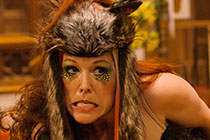|
|
|
|
The Five Provocations
|
 |
Angie Black’s independently produced film offers an
intriguing and disarming mix of elements. Within its first minutes, we pass
from a lyrical, nature-based vision of lesbian love – for a moment there, it
evokes a remake of Picnic at Hanging Rock (1975) with the queer subtext outed – to the type of inner-suburban, baggy-middle-class,
slice-of-life drama familiar from a TV series such as The Secret Life of Us (2001-2005).
We are amidst the lives of lawyers, artists,
“creatives”, people who want to own and run a bar. One married couple has a
daughter living in Paris studying curatorship; a woman faces pregnancy alone,
now that her yoga-teaching boyfriend has skipped town; a single father and his
young daughter face the looming problem of facing and transcending grief over
the dead wife-mother – and that woman is the one we glimpsed in the
dream-flashback belonging to Marlena (Sapidah Kian in a splendid performance)
presented at the very start.
One level of the film is devoted to the relatively
naturalistic depiction of interactions and encounters of these and other,
diverse characters. As paths cross, other lifestyle possibilities emerge – it’s
a fluid, queer vision of the everyday merry-go-round, grounded as much in
friendship as in sexual desire. A special value is placed on the virtues of
open conversation, acceptance, sharing and forgiveness. The narrative is
divided up into titled sections mostly named after the characters, but this
still leaves room for ample surprise concerning who will turn up where in the
unfolding network, and why.
At this level, the film is well directed, crisply shot
(by Matt Jasper), smartly edited and scored. The acting is, across the board,
subtle and engaging. The Five
Provocations has an attractive, TV-style excellence that is becoming more
common in low-budget, digital feature production today. But the provocations
take the project to a second, more distinctive level. They come in various
forms and shapes: Sarah Ward, for instance, performing in the persona of Yana
Alana, gives a show-stopping rendition of “One Woman Show” – a
bursting-into-song fantasia that would not go astray in the equally queer TV
series Crazy Ex-Girlfriend (2015-2019). Another provocation is a dance piece set in a church. Elsewhere,
Maude Davey stumbles into the story like a cool phantom from an Olivier Assayas movie, leading Marlena through nocturnal woods …
It is interesting to see here how Black acts upon an
impulse that has attracted many experimental and independent filmmakers around
the world, Australia included: like James Clayden in his jagged thriller With Time to Kill (1987), Black takes the bold step of
including diverse, more-or-less pre-existing elements from the neighbouring
cultural worlds of performance art, cabaret, and so on. Including them just as
they are – not bending or taming them to fit neatly within the defined
boundaries of the everyday fiction, as so many more conventional films would do
(see just about every Hollywood film that has made a big deal of including performance or video art, usually as the
expression of a sick or misfit mind!). The
Five Provocations “stretches” itself, in various ways, whenever it
introduces one of these surprising segments – and the resulting frisson is salutary.
In some sense, there are really three levels at work
in the film. Because – and without giving too much away here – there was an
extra element of surprise at work for the actors themselves, an improvisatory
factor in their confrontation with each provocative insertion. This adds
another, conceptual aspect to the production: its style has to shake itself
loose, each time, to cope with the veritable screen-event that unfolds. At
these moments, the film transcends tele-naturalism and resonates with, on the
one hand, Jacques Rivette’s film experiments of the 1960s and ‘70s and, on
another hand, the post-1990s artworld inclinations of Miranda July, Josephine Decker or Lena Dunham.
Needless to say, The
Five Provocations immediately wins a rather unique place in the history of
Australian cinema – there’s nothing else quite like it. Let’s hope that the
film-cultural scenes of other countries take some notice of it, too.
MORE Black: Dark Whispers: Volume 1 © Adrian Martin February 2019 |
![]()